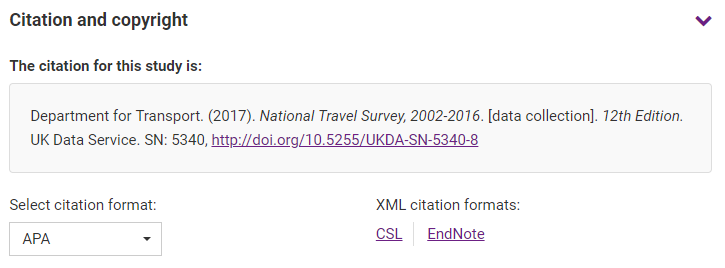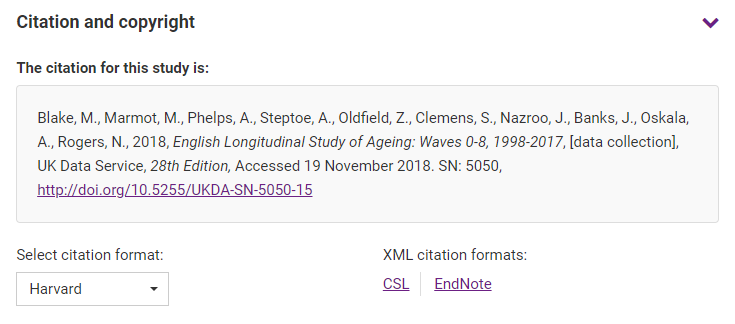The UK Data Service spotlights its #CiteTheData campaign focused on how data citation is central not only to understanding the use of data in the collection, but helps researchers promote their research and contributes to international initiatives on impact – so please #CiteTheData.

This autumn, 11 national research funding organisations, with the support of the European Commission including the European Research Council (ERC), announced the launch of ‘cOAlition S’, an initiative to make Open Access to research publications a reality, where:
By 2020 scientific publications that result from research funded by public grants provided by participating national and European research councils and funding bodies, must be published in compliant Open Access Journals or on compliant Open Access Platforms.
UKRI and the ten national funders forming cOAlition S, together with the European Research Council, have agreed to implement the ten principles of Plan S. UKRI Chief Executive Professor Sir Mark Walport, said:
Making research widely available and freely accessible is essential to unlocking its potential for creating economic, social and cultural benefits.
The Principles will apply to all scholarly publications. But what about data and data repositories?
Principle 8 is particularly welcome to the UK Data Service: The importance of open archives and repositories for hosting research outputs is acknowledged because of their long-term archiving function and their potential for editorial innovation.
The UK Data Service already supports a Plan S compliant data infrastructure, part of a European network where rich and detailed metadata can be harvested for data sharing through the Open Archives Initiative Protocol for Metadata Harvesting (OAI-PMH) – but the data we make available are not so regularly cited. Why is that? After all, they form a key part of the research process. Our campaign, #CiteTheData, aims to improve the citation of data, in the spirit of Plan S where we support:
- Long-range access and a persistent pipeline to the outputs (and inputs) of research in an evolving data landscape
- Public trust in the outputs of research with a focus on ethics, rights, reuse and reproducibility.
Benefits for researchers and research: #CiteTheData and impact?
We know that citing data forms good research practice and our aim is for data to be cited with the same rigour applied to journals articles, books, images and other outputs, but what are some of the other benefits?
Transparency
Citing data is a way of clearly showing exactly which version of which dataset has underpinned or influenced research, as well as crediting those who have made the work possible by collecting the data.
Reproducibility
It helps future researchers to find out which data the researcher has used and enable the research to be reproduced to assess its integrity. Louise Corti, Director of Collections Development and Data Publishing for the UK Data Service, has written a great blog about research reproducibility in qualitative research: Show Me the Data.
Helping track the use of the data
Researchers who gather quality socioeconomic data like that in the UK Data Service collection want to know that the data is being used, just like any other researchers want to know that their book or article has been used to support others’ research.
In addition, bodies that fund the collection of this data want to know that their funding has produced value. It can also help researchers in gaining further funding for future data collection and analysis.
Susan Noble wrote a great post looking at finding out what people have done with data we provide and its impact.
Measuring impact
Researchers want their books, articles and data to be make a difference to others, whether this is on future research, influencing policy or positively changing the lives of individuals, communities or society.
Citing data, like citing any other research helps us at the UK Data Service in measuring and reporting on this impact.
James Scott and Deb Wiltshire demonstrate how social surveys evidence their impact through showing how many publications cite their data in their post on citing your data with the secure lab.
Impact case studies
Find out more about how researchers are using the data, their methods, research and findings in our case studies which show the use of data in the UK Data Service collection and its impact, which can be found on our Impact pages.
Easy ways to #CiteTheData
The UK Data Service make it easy for anyone using data in their collection. Search for any dataset in the data catalogue and then scroll down the page. Not only is there a handy ‘Citation and copyright’ section, but there’s an easy-to-use tool (the drop-down menu on the bottom left) which will convert this citation into APA, DataCite, Harvard and Vancouver formats:


The link used is a DOI (Digital Object Identifier) – even if the web page this data is accessed through changes, that link will always point to the right place. So please help us make citing data as much a part of the research landscape as citing journal articles.
#CiteTheData
This post is part of the #CiteTheCata campaign which the UK Data service is running to help researchers appreciate that citing data is both easy to do and potentially beneficial to everyone. We have a handy video showing our approach to citing data and how easy it is. Find it here.
You might also want to visit:
